In this article, you’re going to discover the 10 best budget DSLRs on the market today.
These recommendations come from hours of research, plus years of shooting with DSLRs as a professional photographer. I know these cameras like the back of my hand – so I can tell you which models are mediocre, which models are best avoided, and which models are going to get you stunning photos day in, day out.
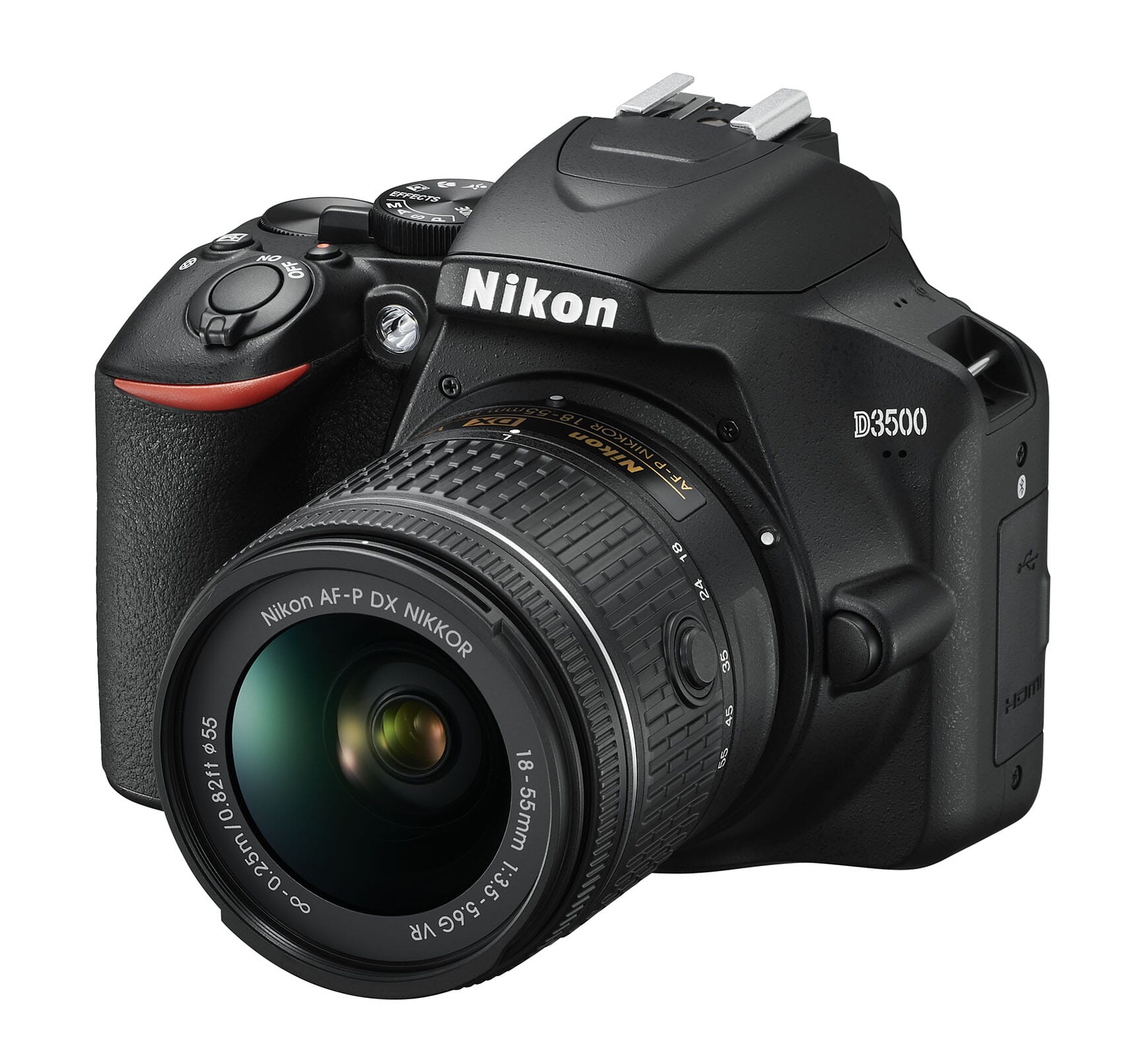
10 Best DSLRs on A Budget in 2023:
When you buy through links on our site, we may earn a commission at no cost to you. We evaluate products independently. Commissions do not affect our evaluations.
Best Budget DSLRs
1. Nikon D3500
The Nikon D3500 offers a superb combination of great image quality, relatively fast autofocus, and top-notch ergonomics.
The Nikon D3500 is, undoubtedly, the absolute best budget DSLR available today. It blows every other camera on this list out of the water, thanks to a very well-rounded feature set and a reasonable ($700) price tag.
It’s impressively compact and lightweight, so you won’t feel uncomfortable, even if you carry it around your neck all day or want to keep it in your backpack or purse while on vacation, while at events, etc.
And it feels great in your hands. The combination of a deep grip and well-positioned buttons will make you want to shoot all day, so if you’re looking for a walkaround camera, the D3500 is a great choice.

The D3500’s autofocus isn’t stellar, but it’s far from bad, and it can focus surprisingly fast; you’ll be able to capture sharp shots of your kids, street performers, iconic buildings – as long as you’re not planning to shoot pro-level sports, the D3500 will do just fine.
Related Post: Canon EOS Rebel SL3 vs SL2
Then there’s image quality, which is beautiful, especially for a camera at this price point. Your 24 MP photos will look gorgeous online and in print, assuming you take the time to get to know your camera properly (and you’ll be helped here by the D3500’s excellent guide mode, which is designed to get beginners up to speed).
Finally, check out that battery life:
1550 shots, which means that you can shoot for days without needing to recharge. It’s the best battery life of any camera on this list (and more than 50% better than our next choice, the Canon SL3). Nifty, right?
Honestly, if you’re in the market for a beginner’s DSLR, go with the D3500. It’s just that good.
2. Canon Rebel SL3
The Canon Rebel SL3 is an all-around great camera, and it also packs several features video enthusiasts will love, including 4K and a fully articulating screen.
If you’re looking for a budget DSLR that offers video capabilities as well as some serious stills power, then the Canon Rebel SL3 is the perfect pick.
Note that the SL3 is one of only a handful of budget DSLRs to offer 4K video, and it’s the cheapest by far. For just $700, you can start recording beautiful 4K footage, which is increasingly a requirement for amateur videographers looking to future-proof their work.
Related Posts
And the Canon Rebel SL3 doesn’t skimp on features, either. In addition to high-quality video, you get a fully articulating LCD touchscreen, which lets you record – or photograph – from all different angles. You can even flip your screen all the way around, which you’ll certainly appreciate if you’re a vlogger or a photographer looking to take selfies.

Speaking of photography, the SL3 is also a supremely capable still photography camera. While the image quality isn’t quite on par with some of the Nikon cameras on this list (including the D3500, above), the SL3 can capture gorgeous photos of pretty much anything you throw at it. And while the viewfinder-based autofocus system is merely average, autofocusing in Live View – which you can do for both stills and video – is ridiculously snappy, and will get you sharp photos for hours on end.
Add to that a compact build and great ergonomics, and you have a camera that you’ll never want to leave at home.
So if you’re a beginner – or even an enthusiast – looking for a camera that shoots gorgeous stills and video, the Canon Rebel SL3 should be your first choice.
3. Nikon D5600
The Nikon D5600 is on the pricier side, but only because it’s packed full of features. You get standout autofocus, gorgeous images, and a beautiful, fully articulating touchscreen.
The Nikon D5600 is Nikon’s latest mid-range APS-C DSLR, and it offers a lot to be impressed by – so if you’re serious about growing as a photographer and you want a camera that’ll serve you well for years to come, the Nikon D5600 is an excellent choice.
I’m not sure what black magic Nikon has been using, but they’ve been steadily shrinking their DSLR lineup. The Nikon D5600 isn’t one of those monstrous DSLRs you’re used to seeing around tourists’ necks; instead, despite its genuinely powerful features, it’s small, light, and just all-around travel-ready, so if you’re looking for a camera to take on vacation or carry around in your bag, the D5600 certainly fits the bill.
Honestly, though, when it comes to Nikon D5600 features, it’s hard to fit it all into a quick summary. The camera packs pretty much everything a growing photographer could want – and then some.
If you’re looking to shoot landscapes or portraits, you’ll love the image quality, especially in low light. This is an area where the Nikon D5600 shines, and it’ll give you clean, detailed shots no matter the situation.

Then there’s the autofocus capabilities, which trounce most of the other cameras on this list. If you’re thinking of shooting action of any type, from football to dogs at play to birds in flight, the D5600 won’t disappoint – and while it’s not a serious sports camera, it does a darn good job at its price point.
Finally, it’s worth noting the beautiful, 3.2-inch, high-resolution, fully articulating touchscreen. The more you shoot with DSLRs, the more you come to appreciate the value of a sharp, clear, easy-to-use rear LCD, and the Nikon D5600’s is the best on this list, hands down. You can review your images, check focus, anything you want, and they’ll look great thanks to the beautiful display.
The Nikon D5600 is a little pricier than many of the other choices on this list. But you get what you pay for, and if you’re looking for a well-rounded camera that can handle the enthusiasm of a growing photographer, the D5600 is worth every penny.
4. Canon Rebel T7
The Canon Rebel T7 isn’t a flashy camera, but it’ll get you great images for a very low price.
If you’re looking for the absolute cheapest camera you can buy – but one that’ll still serve up nice images – then the Canon Rebel T7 is a great little find.
Now, I’m going to state it up front:
The T7 is not a top-notch performer, not really. To keep the price down, Canon stripped it of any notable features, including an articulating touchscreen (there’s just a standard LCD, and it’s fixed), fast continuous shooting (you get the bare minimum, a measly 3 frames per second), and powerful autofocus (you get Canon’s average-to-below-average AF system, and shooting in Live View – via the rear LCD – is ponderously slow).
But the T7 is a good camera, and at just $450 (including a kit lens!), that’s pretty impressive.

And the features I mentioned – fast AF, an articulating touchscreen, and powerful autofocus – aren’t for everyone. If you’re used to using a point-and-shoot camera, you’ll find the Canon Rebel T7’s LCD to be perfectly adequate. If you don’t intend to shoot action, three frames per second and below-average autofocus isn’t a big deal.
Plus, the Canon Rebel T7’s bare-bones feature-set includes a lot to love. Image quality is good, so you can confidently capture high-quality, detailed photos. And, like most of the Canon DSLRs on this list, the T7 is small, light, and easy to use, so it’ll do just fine for casual photography – at events, around the house, at your child’s school, you name it.
If you’re looking for a camera that you can grow with, the Canon Rebel T7 probably isn’t your best choice. But if you want a nifty little camera that’ll get you good photos with minimum effort and at a low price, the Rebel T7 is a genuinely good buy.
5. Pentax K-70
The Pentax K-70 offers a rugged build, plus in-body image stabilization. If you’re after a unique camera that can deal with rough handling, it’s a good pick.
If you’ve made it this far down the list and nothing has really tickled your fancy, then maybe it’s time to look at something different:
The Pentax K-70, which benefits from its manufacturer’s unique approach to camera design, and packs a few highly useful features you won’t find anywhere else at this ($550, body only) price point.
So what makes the Pentax K-70 so special?
For one, its rugged build; the K-70 is weather resistant and dustproof, which makes it a great option for up-and-coming wildlife photographers, event photographers, or even casual photographers who hate putting away their camera when the weather gets messy.

Then there’s the fully articulating screen, which is great for shooting at odd angles. You can get low to the ground for some unique landscape photos, shoot from up high over a crowd, or shoot around obstacles in cramped locations.
Finally, you get the Pentax’s most noteworthy feature:
In-body image stabilization.
Camera shake is the number one culprit of blurry photos, and in-body image stabilization (or IBIS) is a clever way to handle this; the technology identifies the camera’s movement, then compensates for it, so that you can keep shooting handheld even as your shutter speed lengthens (in the dark at night or indoors, for instance).
These days, in-body image stabilization is pretty standard in mirrorless cameras, but it hasn’t – and probably won’t ever – make its way into a Canon or Nikon DSLR. So if you’re a frequent low-light handheld shooter and you like the idea of image stabilization that you always have with you, the Pentax K-70 is the way to go.
And while the K-70’s autofocus and image aren’t especially impressive, they’ll get the job done.
Here’s the bottom line:
If the Pentax K-70’s unique features interest you, then grab it while you can, because it’s a unique camera at a very attractive price.
6. Nikon D7500
The Nikon D7500 is a speed demon, packing lightning-fast autofocus and 8 frames per second; it’s the best budget action camera around.
The Nikon D7500 is one of the most powerful – if not the most powerful – cameras on this list.
It’s also one of the most expensive – so much so, in fact, that we’re pushing the upper edge of the “budget DSLR” segment, because the D7500 clocks in at just under $1000, body only.
But for the right photographer, the D7500 is absolutely worth the cost – specifically, enthusiast photographers looking to shoot sports or wildlife photography, as well as serious photographers looking for a backup camera.
Here’s what you have to look forward to:
First, stellar image quality, including best-in-class high-ISO performance and dynamic range. If you plan to shoot in low-light – such as at indoor sports games or birds at dusk – the D7500 will have you covered.

And speaking of indoor sports, the D7500’s autofocus system is the best on this list, hands down. It’s the action camera to beat, at least in this price range, which is yet another reason why it’s a great pick for budding action photographers. You’ll be able to track moving players and nail sharp shots with ease.
Plus, check out the D7500’s continuous shooting speed:
A very impressive 8 frames per second (second on this list only to the more expensive Canon 90D).
No, it’s not pro-sports-level good, but it’s plenty fast for enthusiast sports or wildlife shooting. And it’s especially attractive when you combine it with the D7500’s RAW image buffer: 50 shots, so you can fire off a series of bursts without slowing.
A high-powered camera like the D7500 does come with some drawbacks, primarily in terms of its size and weight. But the weather sealing is nice and the D7500 is great to hold, so as long as you’re not looking for a camera to wear constantly around your neck, you should be fine.
7. Canon Rebel T8i
The Canon T8i boasts strong autofocus, beautiful image quality, and even 4K video. It’s a comprehensive option for consumers looking to take their photos and videos to the next level.
The Canon Rebel T8i is a very capable camera and one that’s very suitable for beginners seeking an all-around option, or enthusiast photographers looking for a powerful camera without too high a price tag.
The Rebel T8i feels great in the hands, plus it’s small and light without sacrificing build quality. I could definitely see it working for a frequent traveler, or someone who wants to wear it around their neck nonstop while out with the family.
And it’s easy to use, too, thanks to Canon’s guided menu, which will help you understand the importance of different settings and modes.
If you like to shoot architecture, portraits, or close-up nature images, you’ll love the fully-articulating LCD, which lets you get into difficult positions without straining your neck. This is a big deal for vloggers, as well, because you’ll generally want to see yourself when recording.

When it comes to casual action features, there’s a lot to like about the T8i. Autofocusing is good, and you can shoot at up to 7.5 frames per second so you never have to miss those split-second moments.
Image quality, too, is very nice – not class-leading when it comes to detail and low-light shooting, but the T8i is certainly capable and will satisfy even the most discerning photographers, provided you know how to optimize your camera settings for great results.
A nice bonus here is the T8i’s 4K/25p recording. This is a useful feature for video enthusiasts, though you do have to contend with a significant crop. And unfortunately, while Canon included their snappy Dual Pixel AF for Live View shooting, when recording video you only get this in HD, not 4K.
Honestly, the Canon Rebel T8i really is a great camera, and one that works well for beginners and enthusiasts alike. Its main drawback is the price; at around $900, it’s a tough purchase to justify, especially when there are other cameras with similar standout features for several hundred less.
Of course, none of the cheaper cameras on this list offer quite the completeness of the T8i – so if it has what you need and you can afford it, get it. You won’t be disappointed.
8. Canon 90D
The Canon 90D is a high-resolution body that serves up stunning images (and video!) for photographers of all stripes. It is expensive, though, and it offers more camera than most beginners require.
First things first:
At $1,200, body only, the Canon 90D is the priciest camera on this list – so if you’re looking for a bargain model, look elsewhere.
However, if you’re an enthusiast photographer who wants to shoot everything at a decent price, the Canon 90D is certainly worth your time. It packs a whole host of powerful features, and as you’ll soon see, can effortlessly handle most of what you’ll throw at it, from portraits to landscapes to sports and more.
The Canon 90D is a big camera, but – like the Nikon D7500 (above) – this is the tradeoff you get for such a powerful model, especially one with a tough build. And the big body feels great in your hands; there’s a deep, strong grip, plus a nice heft that makes you feel like you’re working with a real piece of machinery. This is ideal for photographers looking for an outdoors-ready camera because you can comfortably take your 90D in the rain, snow, and more (though, as with every camera ever, you should always exercise caution – even the best camera has vulnerable internal parts that shouldn’t ever get wet!).
![Canon DSLR Camera [EOS 90D] with Built-in Wi-Fi, Bluetooth, DIGIC 8 Image Processor, 4K Video, Dual Pixel CMOS AF, and 3.0 Inch Vari-Angle Touch LCD Screen, [Body Only], Black](https://m.media-amazon.com/images/I/41FS2lfxg+L.jpg)
One of the Canon 90D’s many standout features is its resolution:
32.5 MP, nearly 10 MP more than the next pixel-heavy camera on this list, and high enough to allow for huge crops, huge prints, or both. So if you’re someone who plans to print photos with abandon, or you’re planning to focus on a crop-happy genre of photography (i.e., wildlife photography or sports photography), then the higher megapixel count will be helpful.
Unfortunately, higher pixel counts do come with drawbacks, and the 90D’s high-ISO performance does take a hit. It’s not bad, but it’ll put a damper on your plans to shoot handheld in low light after the sun has gone down.
On the other hand, you get a nice autofocus system, one that’ll let you shoot motionless objects all day and can do a decent job with moving subjects. Add to this a whopping 10 frames per second continuous shooting speed, and the Canon 90D becomes a very capable action camera – though the Nikon D7500 is better in terms of pure autofocusing capabilities, so if you’re really set on an action camera, it’s the superior choice.
One area where the Nikon D7500 can’t compete with the Canon 90D is in Live View focusing. Here, the Canon 90D excels, and this translates to speedy focusing when shooting video, as well.
And speaking of video, you get 4K/30p shooting, plus a beautiful, fully articulating touchscreen. This is a perfect combination for hobbyist videography; you can shoot high-quality vlogs with the articulating screen, plus some nice 4K footage.
All in all, the Canon 90D is powerful, and impressively well-rounded, too. While it might not have the action chops of the Nikon D7500 or the low price of the Canon Rebel SL3, it’s the only camera that can compete with both of these models at the same time – and that makes it special.
9. Canon Rebel T7i
The Canon Rebel T7i may be old, but it still packs quite a punch. If you’re after good image quality and fast autofocusing for a decent price, it’s a solid option.
If you like a lot of the Canon Rebel T8i features but balked at the price, then here’s a similarly well-rounded, capable option for you:
The Canon Rebel T7i, which packs a lot of the same punch as the T8i, just at $100 less.
What does this include?
Well, there’s a well-designed, comfortable body – not ultra-light, but on the smaller side for a DSLR. You could comfortably use the Rebel T7i for walkaround photography without getting tired, and it should work fine for travel and street photography, too.
Then there’s the beautiful touchscreen – it’s over a million dots, it’s three inches, and it’s fully articulating, so whether you’re a photographer, a vlogger, or a videographer, you’ll have an easy time composing and shooting in Live View.
Looking at autofocus performance and image quality comparisons, the T7i is consistently good without being great. You get nice, 24 MP images that’ll look great on a monitor or even printed large, plus good high-ISO performance for evening and indoor photography. And the standard autofocus is great for casual photography and even some fast-paced shooting, though it’s still outperformed by the action-oriented Nikon D7500.
If you’re a vlogger, or you’re interested in both video and stills, then you might wish for better recording resolutions (and you might consider paying the extra money for the T8i, or switching focus altogether and checking out the SL3). The Rebel T7i only shoots in HD, and 4K is the standard these days – but for less serious vloggers and video enthusiasts, the T7i may offer just enough to keep you satisfied.
All in all, the T7i is a good camera, and surprisingly well-rounded if you exclude video. It’s not the flashiest camera on this list, and despite its age, the price is still on the high side.
But if you’re impressed by the articulating screen, the image quality, and the autofocus, then the T7i is a worthwhile buy.
10. Canon Rebel T100
The Canon T100 is ridiculously inexpensive. Yes, its features are basic, but image quality is decent, and for some consumers, that’s enough.
If you’re after a true budget DSLR, then the Canon Rebel T100 certainly fits the bill. It’s the cheapest camera on this list, priced at $419 (including a kit lens).
But while the Canon Rebel T100 is certainly capable of great photos, everything about it screams discount, from the plasticky body to the low-resolution LCD to the subpar, ridiculously outdated 18 MP sensor.
Honestly, all of this can work, assuming you’re looking for the most basic DSLR you can grab.
And there’s nothing wrong with going basic, if you’re a beginner and you’re not looking to do anything with your camera but casual photography.

After all, while the 18 MP sensor is outdated, it still gives clean, detailed images at low ISOs. You’ll only start to struggle when shooting in dark environments – indoors or at night.
And while autofocus is annoyingly slow, if you’re planning to shoot motionless subjects, such as famous architecture or landscapes, this won’t be a problem. Same with the sluggish, 3 frames-per-second shooting speeds.
In truth, my biggest gripe about the T100 isn’t the autofocus, and it’s not the image quality, either.
It’s the rear LCD screen.
It’s fixed in place and offers no touch functionality. But the main issue is its resolution; as I mentioned above, it’s just bad, which makes it tough to preview images and check the sharpness and just have a good all-around shooting experience.
Again, there is a place for the Canon Rebel T100.
And if you’re after the cheapest DSLR you can find, the T100 is a reasonable pick.
But for anyone looking to take their photos beyond the basics, the T100 probably isn’t the right choice.
How to Pick the Best Budget DSLR for Your Needs
Looking for the best budget DSLR on the market today?
Choosing from the dozens of available models can be difficult – and sometimes overwhelming.
That’s why we’ve created this nifty little buying guide for you, which explains all the key features to look at in a DSLR, and why they may (or may not) matter for you as a photographer.
Starting with:
Build and Ergonomics
Cameras can be hefty or light, huge or compact, comfortable or all-around tough to hold.
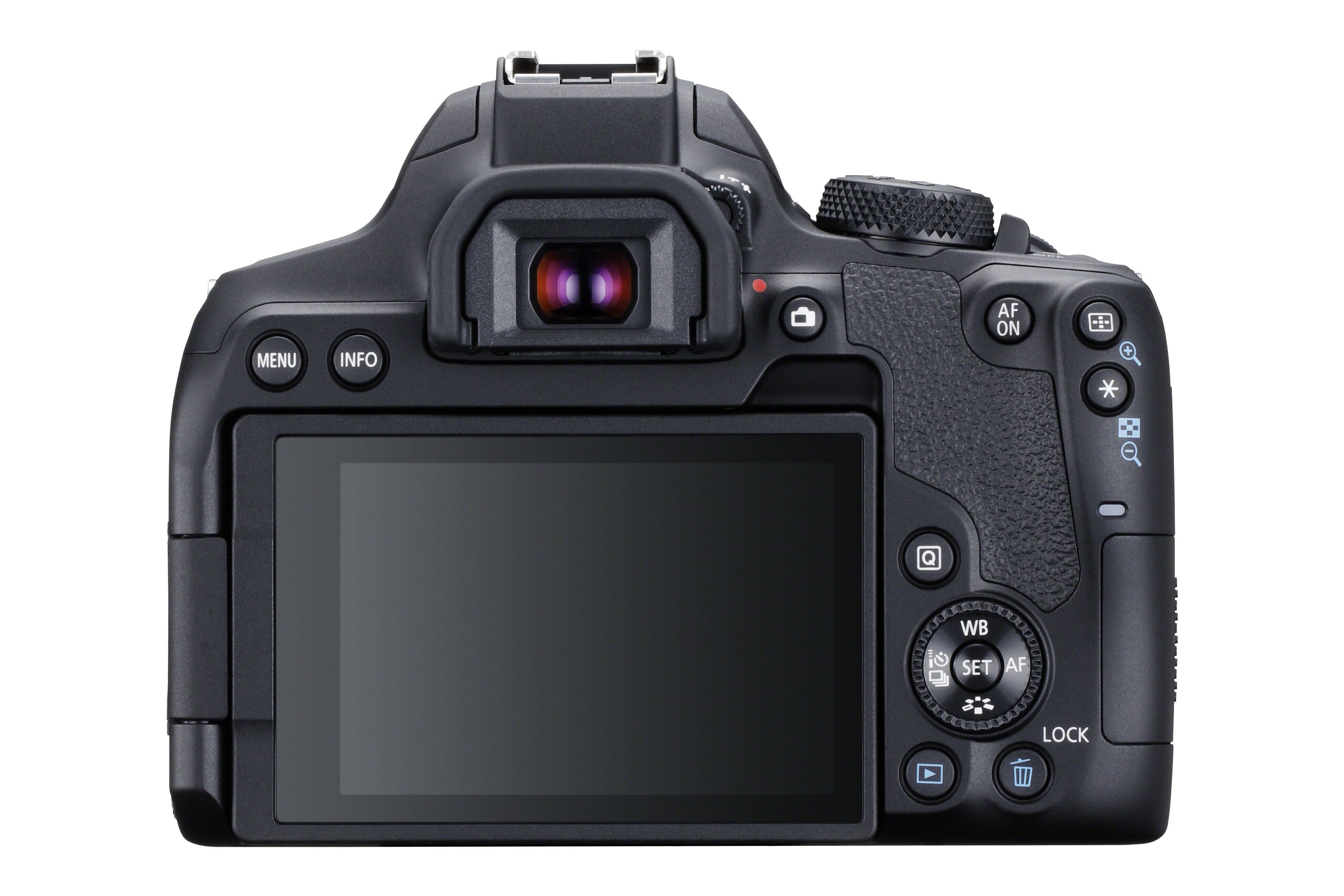
Unfortunately, there is no single perfect combination of build and ergonomics. A frequent traveler might prefer one camera, whereas a studio portrait shooter will favor a different model entirely.
It depends on you.
So before buying a DSLR, ask yourself:
Do I need a lightweight body for travel? A well-built body for shooting in the rain and snow? A larger body to fit larger hands?
And as you look at different camera models, keep the answers in the back of your mind.

Because if you plan to travel with your camera or do frequent walkaround, on-the-go photography, you’ll want something lightweight and compact (and you can let build quality take a backseat).
Whereas if you want to shoot landscapes or wildlife, you’ll need a rugged camera, one that can shoot through a rainstorm, a snowstorm, or blowing sand.
If you want to keep your camera with you at all times and shoot handheld, comfort is paramount – whereas if you’re a landscape snapper who captures hour-long exposures, a less-sculpted model will undoubtedly do the trick.
In terms of ergonomics, many modern cameras offer fully-articulating LCDs, many of which pack touch capabilities.
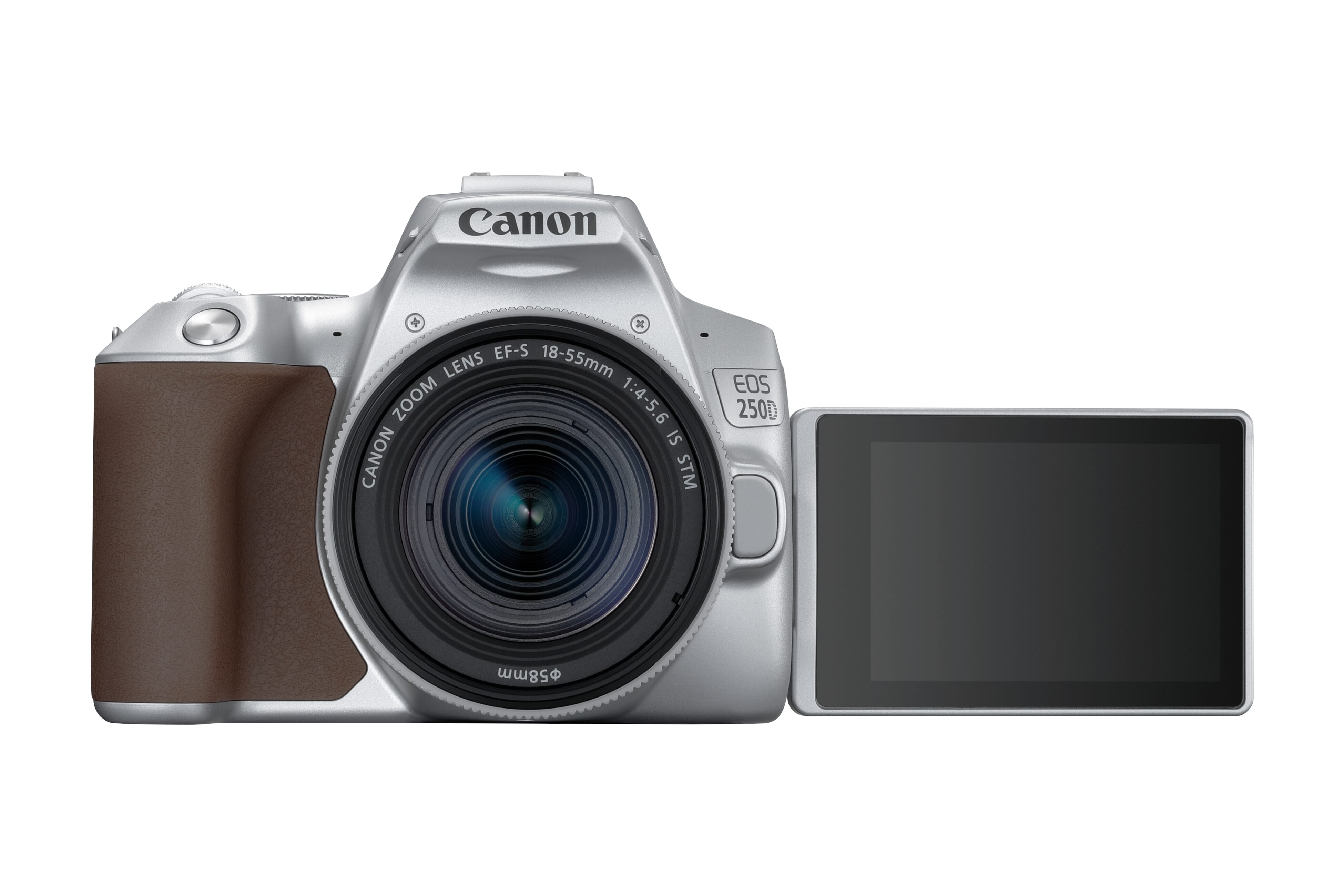
If you mostly shoot through your viewfinder, a fully-articulating touchscreen isn’t a big deal. But for architecture photographers, macro photographers, and videographers, the ability to twist the rear LCD and compose at any angle is a huge bonus, because it’ll let you capture unique shots (and save your neck in the process).
Autofocus Performance and Speed
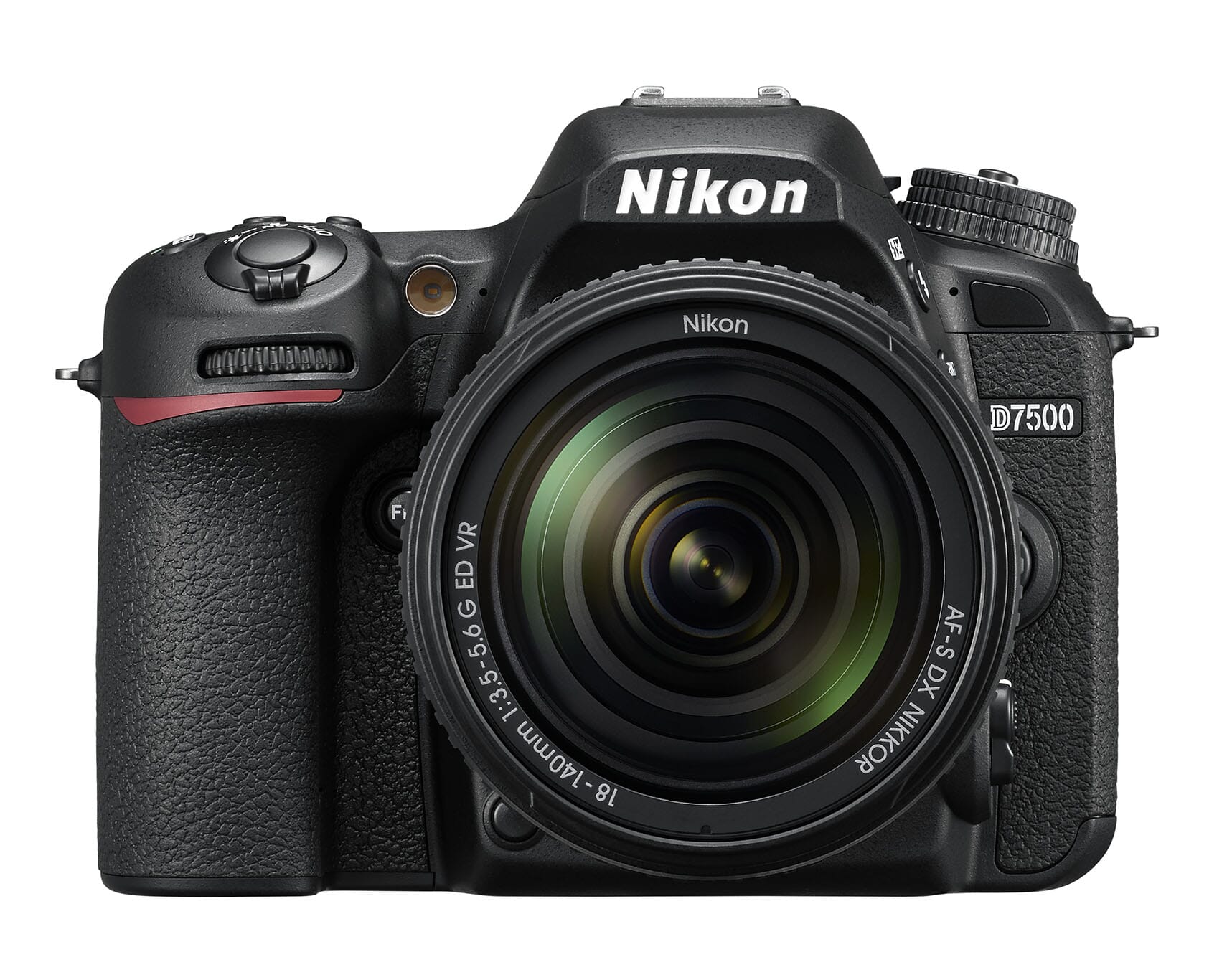
If you plan to shoot sports, wildlife, birds, or even street subjects, then you absolutely need a high-performance camera.
Otherwise, your shots will end up blurry, and you’ll come home frustrated every time.
What does a high-performance DSLR offer?
First, autofocus should be as good as you can get it within your price range. Note that more autofocus points are generally better, though the type of autofocus points matters, too (cross-type AF points are the way to go!). This is what will let you track sports players in mid-leap and birds in mid-flight.
Second, you’ll want fast continuous shooting speeds. If your camera can’t fire off a burst of frames at the critical moment, then you’ll often fail to get the shot – because action photography often does involve a “spray and pray” technique, where you capture a series of twenty images and pick the best one after the fact.
If action capabilities are important to you, I’d recommend a continuous shooting speed of at least 6 frames per second, but 8 is better, and 10+ frames per second pushes you into pro-level territory.
Finally, you’ll want to pay attention to your camera’s RAW buffer. A camera with a big RAW buffer can fire off long series of shots without pausing, whereas small-buffer models will stop shooting after 10 shots. When shooting action, bigger buffers are essentially always better, because they’ll let you keep on snapping pictures, which in turn increases your chances of getting the perfect frame.
Image Quality
These days, pretty much every DSLR is capable of stunning images in optimal conditions – the real question is how they perform in low light and in situations with a wide range of tones.
Cameras with better high-ISO performance are capable of impressive low-light photos (e.g., indoor event shots, indoor portraits, night sky images, and more). So if you plan to shoot indoors or at night, a quality high-ISO camera is a must-have; it’ll let you keep shooting long after other photographers have packed away their cameras.
Some cameras also offer superior dynamic range.
In other words, they can capture a mix of very dark and very bright tones in a single scene without skimping on detail.
While a high dynamic range camera doesn’t matter much for, say, sports photography, landscape, and travel photographers love a wide dynamic range because it allows them to capture sunrises and sunsets without the need for complex techniques (such as bracketing, which requires a tripod plus time-consuming post-processing).
Make sense?
Video Capabilities
Do you care about shooting video?
That’s a key question, and one that every consumer should ask before buying a DSLR.
If video doesn’t matter to you, then you can safely ignore this section, and you can pick your budget DSLR based on the other factors discussed above.
But if video does matter to you, you’ll want to think carefully about the capabilities you need.
Most DSLRs, including budget DSLRs, offer some form of video. But whether it comes with fast autofocusing (or slow autofocusing, for that matter), high-resolution recording, mic jacks, headphone jacks, and more depends on the camera you buy.

These days, serious videographers and content creators require 4K video – ideally uncropped, which will give you more freedom when shooting on the wide end. But if you’re planning to film the occasional home movie, HD (i.e., 1080p) recording will do just fine.
Note that, for vlogging, a fully-articulating rear LCD is important, because you can use it to check your composition and focus when recording yourself.
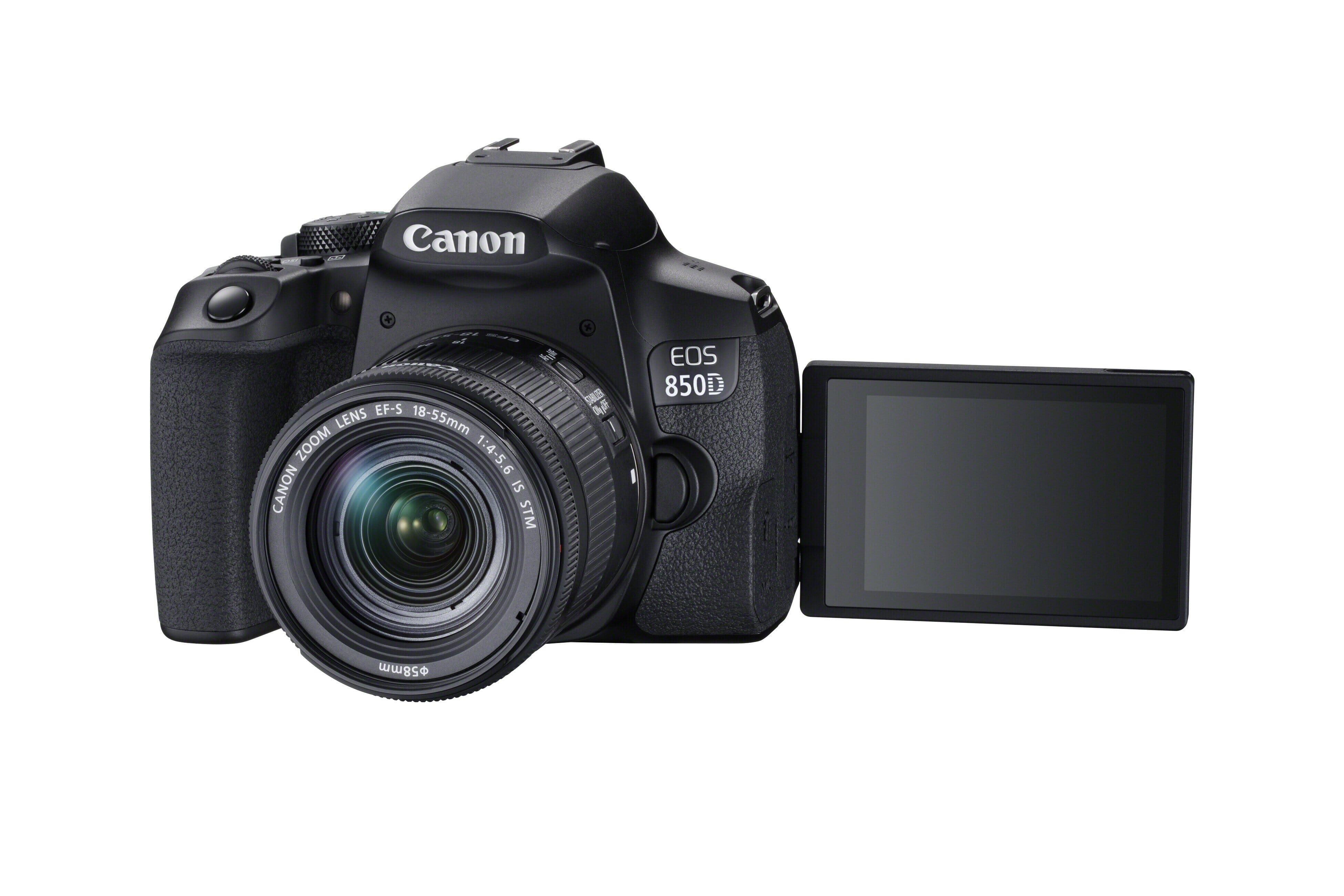
And while a fully articulating LCD isn’t required for other forms of videography, it’s still ultra-useful to have.
Which Budget DSLR Is Right for You?
Now that you’ve finished this article, you know all about the best budget DSLRs available in 2025 – and you hopefully know which DSLR fits your needs.
Here’s a brief recap:
- For photographers looking for the absolute best combination of price, ease of use, and performance, the Nikon D3500 is the best of the best
- For photographers who also shoot video, the Canon Rebel SL3 is the way to go
- For serious photographers with a bit more money to spend, the Nikon D5600 is a great choice
- For photographers impressed by in-body image stabilization at a great price, the Pentax K-70 is the right pick
- For action photographers in need of a fast performer, grab the Nikon D7500 or the Canon 90D
- And if your budget is wire-thin, pick the Canon Rebel T7 or the Canon Rebel T100
So don’t wait! Grab your perfect budget DSLR today – and start shooting!
Disclosure/Disclaimer: As an Amazon Associate, we earn from qualifying purchases. Certain content was provided "as is" from Amazon and is subject to change or removal at any time. Product prices and availability: Amazon prices are updated daily or are accurate as of the date/time indicated and are subject to change. Any price and availability information displayed on Amazon.com at the time of purchase will apply to the purchase of this product.





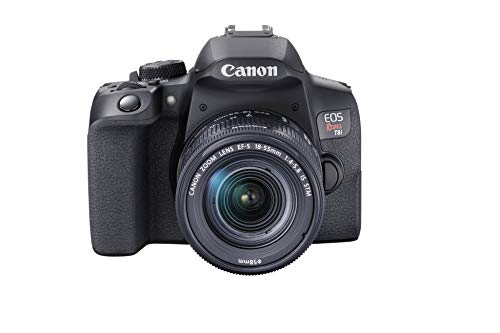
![Canon DSLR Camera [EOS 90D] with Built-in Wi-Fi, Bluetooth, DIGIC 8 Image Processor, 4K Video, Dual Pixel CMOS AF, and 3.0 Inch Vari-Angle Touch LCD Screen, [Body Only], Black](https://m.media-amazon.com/images/I/41CT8Bz8kQL.jpg)

